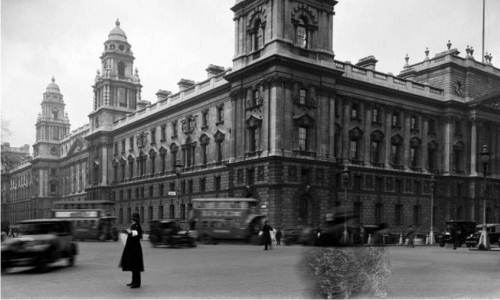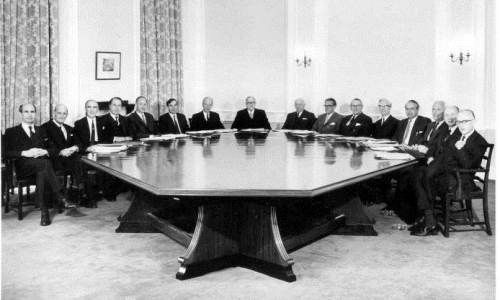Research Themes
Health policy in Britain since the creation of the NHS in 1948 has been the responsibility of government ministers, who have relied on expert advice from a number of sources. They have had constant advice from civil servants (non-political, some medically qualified), and from the late 1960s also began to supplement this through the appointment of special advisers such as Brian Abel-Smith. Government ministers have also benefitted from intermittent and ad hoc contact with senior members of the medical profession: through the Standing Medical Advisory Committees, informal networking and professional representative bodies such as the British Medical Association, the Joint Consultants Committee and the Academy of Medical Royal Colleges. Some commentators have suggested a relative decline in influence that these bodies have exerted on health policy, particularly since the 1970s.

Government Offices, Great Hall Street, mid-late 1940s
No research to date has attempted to position this changing medical authority relative to the emergence of two new groups of health policy expert advisers: health economists and management consultants, who from the late 1960s have been employed in increasing numbers by the government in new units such as the DHSS Economic Advisers Office, placed within regional health authorities, or on specific consultancies through external companies such as McKinsey & Co. A further source of policy advice has been developed through external think tanks such as the Kings Fund, the Nuffield Trust, the Office of Health Economics and the Institute of Economic Affairs.

A meeting of the Medical Research Council, mid 1960s
This project seeks to understand this hitherto under-researched policymaking transition through the following research questions:
- How has the relationship between the government and the medical profession (as represented by the Royal medical colleges and the BMA) changed in Britain in relation to the advent of other sources of expert advice?
- How did the discipline of health economics develop and what are the mechanisms through which it has sought to influence health policy?
- How have management consultancy businesses developed their interest and involvement in the NHS?
- What has been the impact on health policy in Britain of expert medical, economic and managerial advice?
These questions will be addressed through specific case studies to include geriatric care, patient management within hospitals and prescribing policies.
The key research objectives the National Institute for Health Care Excellence case study addresses are:
1. To analyse timing and process in the formation of NICE in 1999.
- How did this align with other significant UK public policy developments, such as the formation of National Institute for Health Research?
- What was the role of senior medical professionals, health economists, NHS managers and politicians?
2. To establish a detailed history of the development of NICE.
- What was the rationale for its apparent prioritisation of technology appraisals – mainly for new drugs?
- How did it evolve from the regional NHS DECS and other public bodies?
- How were the key principles established, and how did they map to existing NHS principles?
- How did the ‘£20,000-30,000 QALY threshold’ emerge?
- How were decisions made on developing a portfolio of guidelines (and making these freely available via a website), and on expanding its remit into public health, health promotion and social care?
3. To identify changing public attitudes to a significant new determinant of NHS policy.
- What were the triggers for public campaigns on specific issues (e.g. Herceptin)?
- How were these managed within existing governance systems and how did they stimulate new mechanisms (e.g. patient access schemes)?
- What was the process for integrating public involvement in NICE, and the impact of evolving mechanisms (e.g. Citizen’s Council, committee representation)?
- How has NICE driven the policy emphasis on value-based healthcare (e.g. outcomes that matter to patients)?
4. To identify and analyse ‘tension points’ when NICE has provoked new challenges to NHS governance.
- How have politicians and civil servants collaborated with or side-lined the process (Relenza; Cancer Drugs Fund, 2012 Health and Social Care Act, ‘disinvestment’ policies)?
- How have decisions about ‘affordability’ been separated from those of ‘cost-effectiveness’?
5. To analyse how NICE has exploited/competed with existing health policy expertise.
- How did NICE relate to the wider re-packaging of ministerial advice (e.g. the abolition of the Standing Medical Advisory Committees, the creation of ‘czars’)?
- What was the impact on the royal medical colleges who were funded by DH to produce clinical guidelines, and on academic health economics units, which were funded by DH to conduct technical appraisals?
- How effective was the initial Partners Council?
- Has NICE stimulated cultural shifts in the medical profession (e.g. a willingness to promote campaigns such as ‘Choosing Wisely’, ‘Realistic Medicine’ and ‘Prudent Healthcare’)?How has NICE stimulated the growth in health economics?
6. To establish the mechanisms through which the NICE model has been exported (NICE International was formed in 2008) and make an initial assessment of the operations of similar bodies and their impact on health governance in a number of countries.
Back to: Institute of Population Health